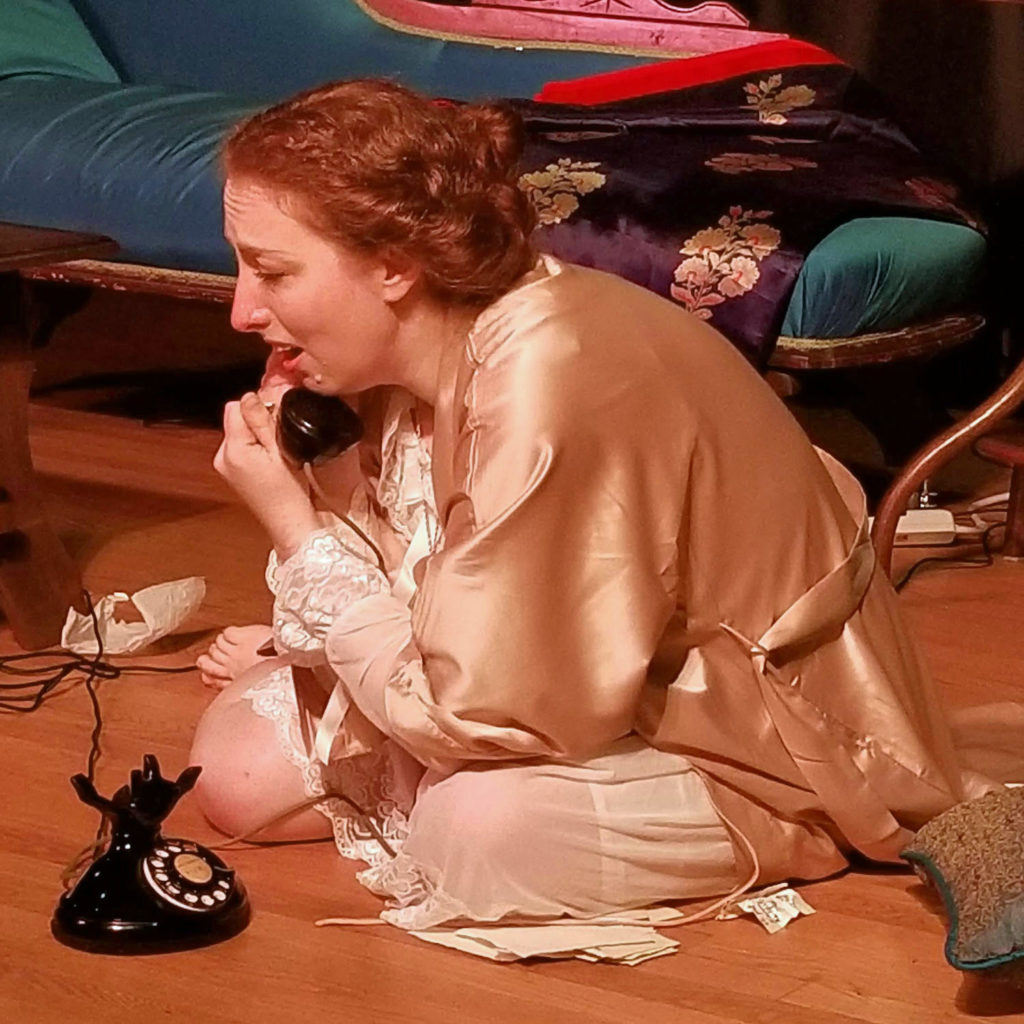Two telltale modern one-act operas, one born in the razzle dazzle of mid-20th century New York, the other in the lingering disillusionment and artistic rebellion of post World War I Paris. The Telephone, words and music by Gian Carlo Menotti, thoroughly beguiles, an unapologetic comic curtain raiser that continues to captivate long after its Broadway premiere in 1947. La Voix Humaine, adapted and set retrospectively by Francis Poulenc from a late 1920s stagework courtesy Parisian avant-gardist Jean Cocteau, likewise endures, still tearing at the heart sixty years after its first performance, a shattering psychodrama, harrowing, haunting, grimly revealing.
Both are linked to posterity by the same instrument of communication. Imagined phone lines compress and channel libretto into a stream of plainspoken dialogue, generally one-sided even when more than one character occupies a scene. Human connectivity — or lack of it — is urgently present here, themes of particularly sharp relevance in these times of severely restricted human contact.
Dialing up an engaging blend of gaiety and disquietude, Toronto City Opera launched its 2020/21 virtual season late last week with a novel neo-operatic presentation of a compelling Menotti/Poulenc double bill. Taken together as a single 90-minute encounter, the two pieces, The Telephone and La Voix Humaine, make for vibrant programming.
The opening piece, Menotti’s witty, crisply observed opera buffa update sets the on-screen proceedings in motion, musical sketch humour at its most urbane. The intention here is not to satirize, however, or to lampoon but rather to squeeze and stretch a single good-natured gag to the point of comic chaos.
Ben, a harried young businessman, attempts to propose to his girlfriend, Lucy, only to be endlessly thwarted by the chatty young woman’s preoccupation with her mobile. Finally, after untold interruptions, exasperated but undaunted, Ben succeeds in winning her attention by dialing her number via his own cell phone. Technology ironically saves the day. Lucy agrees to marry him. A sweet, flawlessly gauged duet and all ends lovingly as any respectable romcom should.
Appearing in The Telephone’s only two roles, soprano Nicole Dubinsky and baritone Johnathon Kirby charm and enchant with their bright, polished evocations of radiant Menotti trademark colour and generous phrasing. Dubinsky’s handling of Lucy’s bubbly arietta, Hello! Hello! Oh, Margaret, it’s you is particularly captivating. The humour and playfulness on show is perfect.
Narrative, atmosphere and score in La Voix Humaine could not be more opposed.
A disheveled bedroom. A telephone rings. A young woman answers, visibly exhausted and distraught. Her ex-lover is calling to arrange for the return of a few odds and ends he has left in her flat. The woman is shattered. A tortured monologue ensues during which she wrestles with reality and denial, surrender and self, before revealing that she has attempted suicide with an overdose of sleeping pills the previous night. Memory and despair overwhelm. Je t’aime. Je t’aime. She hangs up. Time stands still.
Poulenc’s music mirrors his protagonist’s anguish, tortured, tender, raging as the woman identified only as Madame is swept up in wave after wave of relentless churning emotion with little in the way of formally structured troughs and crests. Harmony is neither exclusively tonal or atonal here. Dissonance and chromaticism jangle and clash yet, against all expectation, the musical momentum never truly falters. Lyricism endures, fitfully granted, yet nevertheless robust particularly evident in the composer’s deeply affecting writing for extended passages of lonely solo voice.
Singing the extraordinarily taxing role that lies at the centre of regret that is La Voix Humaine, soprano Rachel Krehm is nothing less than spectacular in this, Toronto City Opera’s virtual showpiece, bringing a depth and breadth of humanity that far surpasses the company’s current small screen venue. Infinitely nuanced, dramatically centred, superbly theatrical, Krehm’s presence bursts free of the HD frame, a breathtaking virtuoso performance of boundless passion and seemingly limitless musicality. Ce fil, c’est le dernier qui me rattache encore à nous, she sings. An excruciating sentiment made utterly credible by a fine gifted singer actor.
Music Director, collaborative pianist Ivan Jovanovic, partners, conjuring great swaths of orchestral texture, rapturous at times, ferocious when required, playing with great investment, summoning an eternity of darkness flashed with pain, respectful, even deferential during vital vocal moments. The Menotti is no less well served, albeit infinitely gentler. Butterflies vs demons.
Shot in one day in Tapestry Opera’s Ernest Balmer Studio, each of the two operas recorded in a single uninterrupted take with no audio overdubs and minimal video post production, Toronto City Opera’s Menotti/Poulenc diptych represents something of a pioneering milestone — music theatre staged for camera and mic recorded as legitimate live event. The results as witnessed by the zest and resonance of TCO’s The Telephone and La Voix Humaine are singularly rewarding. A refreshing viewing experience well worth catching as opera continues to move forward in its crisis-driven evolution from theatre stage to digital platform.
* * *
Virtual tickets for The Telephone and La Voix Humaine can be purchased at torontocityopera.com. Last video performances: Saturday, November 7.


